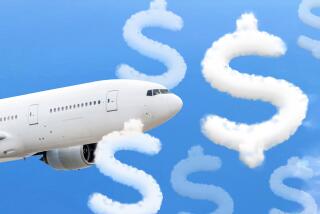Overseas Flights Soar Despite Sagging Dollar
- Share via
WASHINGTON — U.S. airlines that rely on international traffic for a share of their profits say that traffic is strong, despite the falling value of the dollar.
Pan American World Airways and Trans World Airlines suffered last summer as Americans stayed home because of the disaster at the Chernobyl nuclear power plant and fear of terrorism, but this year the airlines say traffic is up substantially.
United Air Lines, which acquired Pan Am’s Pacific routes and began flying them in February, 1986, may even be benefiting from the dollar’s weakness relative to the Japanese yen. “We sell more in the Pacific than we sell in the U.S.,” said Donald C. Moonjian, senior vice president and general manager of United’s Pacific division. “Japan is the only country in the world that sends more visitors to the United States than the United States sends to it.” For those travelers, the United States is increasingly a travel bargain because of the dollar’s weakness, he said.
The dollar has fallen 12% against the yen since December and has also fallen relative to Western European currencies, although by not as much.
Travel industry analysts said that a change in currency values usually takes a long time to register on travelers. As a result, the dollar’s rise or fall doesn’t have an immediate impact on international traffic.
“I don’t think the anticipation of travel being more expensive because of the weakness of the dollar” deters travelers, said George James of Airline Economics Inc., a firm that provides research and analysis in the airline industry.
“Our traffic projections and our bookings are stronger than ever,” said Pamela Hanlon of Pan Am. Hanlon said total air traffic for the company was up 38.4% in April, with transatlantic traffic up 40.9% over last year’s weak bookings.
Europeans, who--like the Japanese--might be tempted to travel to the United States because their currencies buy more now, tend to be quicker to react to currency changes, said Hanlon and others.
“Logic tells you that the dollar should have some dampening effect,” said Robert Cozzi, vice president of revenue management for TWA. But Cozzi said he thought promoters of travel packages were helping to offset the dollar’s weaknesses by finding economy lodgings and other savings.
TWA, which suffered through both a strike by its flight attendants and a fatal explosion on an Athens-bound flight last spring, has reduced its capacity on transatlantic flights by about 10%, Cozzi said. The air carrier’s traffic was up 29% last month, compared to the same month in hard-hit 1986.
United had difficulties operating the Pacific division routes last year but says it is now overcoming them. Pacific passenger traffic in March was up 31% over last March, according to Richard J. Ferris, chairman of Allegis Corp., the holding company that owns United.
More to Read
Inside the business of entertainment
The Wide Shot brings you news, analysis and insights on everything from streaming wars to production — and what it all means for the future.
You may occasionally receive promotional content from the Los Angeles Times.










